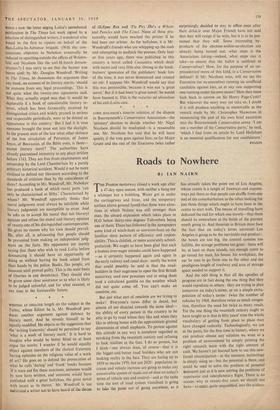WHEN I SAW the letter urging Lolita's unmolested Publication in
The Times last week signed by a selection of distinguished writers, I wondered who would be the first to riposte on behalf of the Ban-Lolita-ln-Advance brigade. (Will the con- scientious objectors to Nabokov eventually be reduced to squatting outside the offices of Weiden- feld and Nicolson like the anti-H-bomb demon- strators?) I was sorry to see that the banner was borne aloft by Mr. Douglas Woodruff. Writing in The Times, he denounces the argument that any book, on account of its literary merits; 'should be immune from any legal proceedings.' This is not quite what the twenty-one signatories said. What they actually urged was that It would be deplorable if a book of considerable literary in- terest, which has been favourably received by distinguished critics and widely praised in serious and respectable periodicals, were to be denied an appearance in this country.' But I feel it is time someone brought the issue out into the daylight. In the present state of the law what other defence of the free circulation of Petronius, of James Joyce, of Boccaccio, of the Bible even, is there— except literary merit? The authorities have already guaranteed immunity to any plays written before 1743. They are free from examination and censorship by the Lord Chamberlain by a purely arbitrary historical accident. Would it not be more civilised to defend our literature according to the standards of criticism than by the coincidence of dates? According to Mr. Woodruff, Mr. Nabokov has produced a book of which many parts `can only be characterised as filthy.' Characterised by whom? Mr. Woodruff apparently thinks that moral judgments must always be infallible while literary judgments are susceptible to error. And he asks us to accept his moral (but not literary) opinion and refuse the moral and literary opinion of twenty-one of his distinguished contemporaries. He gives no reason why his view should prevail. He, after all, is advocating that people should be prevented from making an independent judg- ment on the facts. His opponents are merely saying that those who wish to read Lolita before denouncing it should have an opportunity of doing so without having the book seized from their hands by the police. Books, like people, are innocent until proved guilty. This is the most basic of liberties in any democracy. They should also be given some clear assurance as to what is likely to be judged unlawful, and for what reasons, at any time in the foreseeable future.
* * *










































 Previous page
Previous page